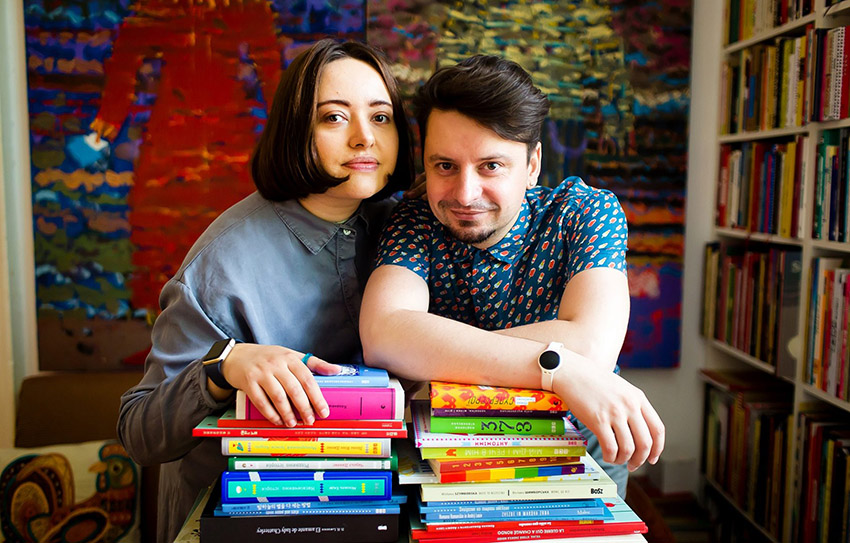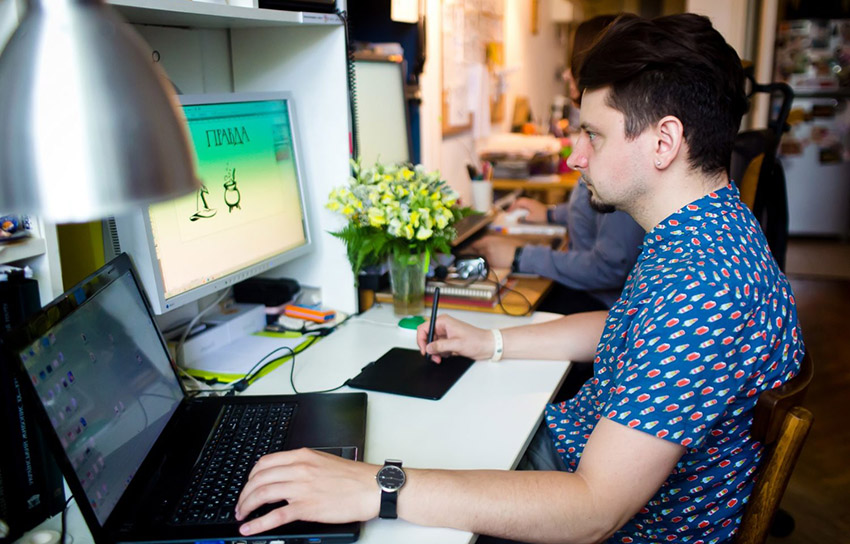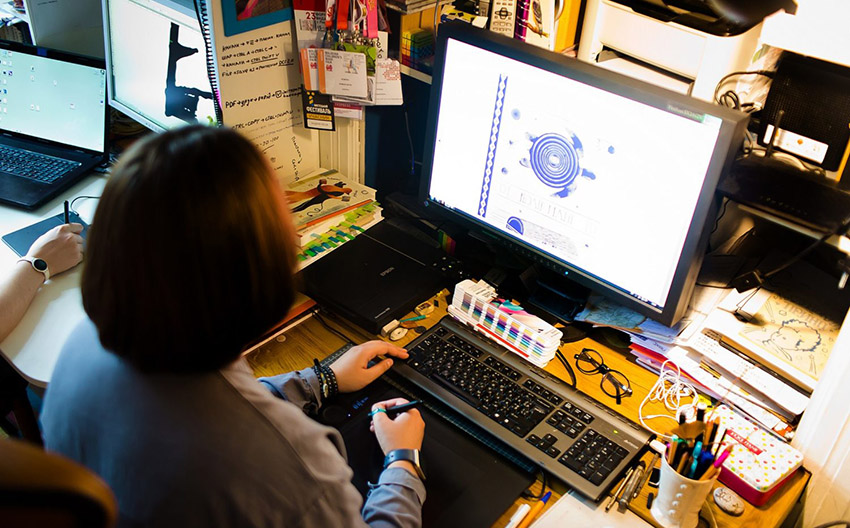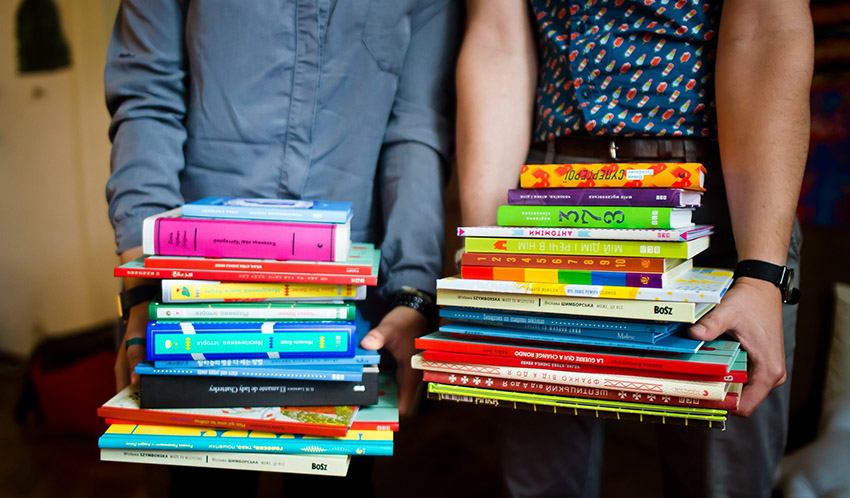“Agrafka” - The Ukrainians

A married couple and a creative duet consisting of Andriy Lesiv and Romana Romanyshyn talk about modern Ukrainian books, illustrator’s work, “Agrafka” and an ability to surprise oneself.
The Ukrainians. [This article is published in partnership with Odessa Speaks English, an initiative whose main goal is to encourage the development of an English-speaking social and cultural setting in Ukraine generally and Odessa specifically.]
Way to a Job You Can Dream of
Andriy: Both of us have hit the same road. That’s because we started to work with books together and never parted since then.
Romana: I studied at the College of Applied and Decorative Arts named after Ivan Trush. My specialty was applied painting. After that I graduated from Lviv Academy of Arts, where I used to study at the department of glass art. I wanted to work with tactile 3D material then. So, sculptural images were what I was mainly interested in.
Andriy: As for me, I went to a restoration department of the Academy, in turn. It’s a completely different area of focus. Yet, we started to work with covers together. We still remember our first one. We would definitely create a completely different cover now. (Smiles) It was an interesting experience, as everything happened by chance to a certain extent. My pal used to be an editor of Litopys publishing house. They had a problem with the cover, and the book was supposed to be printed asap. He asked for our help. We agreed. And we liked it back in 2004.
Maiden Attempts to Deal with Books
Andriy: We realized a need to work with books in Krakow academy of Arts. We participated in scholarship program of GAUDE POLONIA there. After watching their book processing presentation our intuitive assumptions have been proven. We saw a reference point and understood that we can put our plans into practice.
There are moments when something switches and you see that you’ve found your own algorithm or model in question. That’s what happened to us in 2010
Romana: We used to work by intuition before that internship. We just suspected that they do what’s close to us somewhere on Earth. We’ve made sure that there is such a “planet” during the internship program. And we saw people like us. There are moments when something switches and you see that you’ve found your own algorithm or model in question. That’s what happened to us in 2010.

Working as Spouses and Creative Duet
Romana: It’s not unique that we work as a pair. There are many famous designer “duets”. We align ourselves both with a married couple consisting of Charles and Ray Eames plus Rosita and Ottavio Missoni. The latter pair also works as a “closed-circuit” organism. Two heads are really better that one, and an algorithm of two persons is very efficient. Just be on the same page. We must clearly separate our duties. Besides, we often work together, but we provide much space to each other. We resemble two planets that revolve around each other — we share the same orbit.
As for applied work, I draw and create all images, while Andriy deals with fonts and finalization. Everything happens rather synchronously. We try to take care of each other and notice when any of us forgets to eat. (Smiles)
There are many famous designer “duets”. We align ourselves both with a married couple consisting of Charles and Ray Eames plus Rosita and Ottavio Missoni
Andriy: Writers love isolation while working. The same applies to us. But there are two isolated persons in our case. We work mostly at night, since it’s time when you feel a certain informational silence.
Craft Peculiarities
Romana: We are rather disciplined people in terms of time management, since if you forget about it, you decondition. There are also deadlines that are good incentives for work. A part of our time is spent on constant learning and self-improvement, and we spend another part of it to write messages. We work 5-7 hours per day when a project is launched, while we may sleep just 5 hours in the end, when we are already tuned in.
Andriy: We are not familiar with a scheme based on Monday-Friday working week. It’s hard to tell our friends sometimes why we cannot accompany them on a Saturday or Sunday. That’s a freelancer’s lifestyle, and we must control it.
To work with a book one should understand creative process. I mean composition laws, color science and drawing principles. All the artist’s tools are vital.
Romana: Book illustrations demand for a completely different approach to design when compared to magazine illustrations. It requires knowledge of printing process and technology. There are many restrictive limits. Yet, you must feel absolutely at home with them and expand your own limits.
Birth of “Agrafka”
Andriy: When we started to work, we did not think about whether dealing with books is a promising area of focus or not. We used to do what was close to us. That’s because it was normal for both of us to see our parents with books and read. We consider ourselves not only illustrators but also, broadly speaking, artists. We work mainly with books, but our approach to them is complex and integral. Book-making is a form of art for us.
Romana: We were not sure what to do next even after we had graduated from the Academy. It was an evolutionary and long-term choice. Our internship abroad played an important role. This time with its tight schedule when we worked with books only resulted in the idea that it was what we had been looking for all the time.
Andriy: “Agrafka” trade name was not coined at once. Our work began in 2003, and the art studio was founded in 2010. We had seven years to name this “ship”. And we had strict naming requirements. The name was supposed to sound equally well when using different languages. Even those who do not understand its meaning were supposed to be able to spell it. And it was supposed to contain our favorite letters. “G” (“Ґ”) is my favorite one, and it’s “F” (“Ф”) in case of Romana.
Moreover, “Agrafka” is a pin used as a protective charm in Galicia. That served as a certain extra stimulus. Well, this word resembles “graphics”, too.
Beginning
Andriy: Our careers started at the time when Ukrainian market had nothing to offer but plain text-only books. When compared to now it was a horse of another color. We used to work much just to be busy with this job during the first few years. We accepted projects no matter if they were really handed over to us or not. It just so happened, that publishers became interested in all of them, and they were realized later on. We had a ready product to show to everybody. So, we did it instead of waiting for someone to ask us for something.
We’ve sent “Mitten” book that had been created for an exhibition to all the Ukrainian publishers we could find. Yet, their answers were negative — it was too non-standard for them. This could lead to a depression, but we were so crazy that we’ve taken all our savings to print 100 copies. We’ve created hand-made cases for every house and sold the book quite easily using the Internet. A publisher saw 1 copy and realized that there is a critical mass of consumers who are ready to buy such a product. So, he offered to co-operate.
Romana: Actually, everything had to be done from scratch then. Publishers had a vague idea of reader’s needs. Now people have a certain vision, they write down strategies. But it looked like an absolute desert, tabula rasа then.
We earned a bit just to spend all the earnings on travelling, since it’s important to see what happens in the world. You can sit at home and consider yourself a genius. Yet, when you are about to perform big time, you see how many things need to be improved.

First Successes
Andriy: Our idea of success differs from what other may think about it. Financial benefits are not the most important things for us. It was an extremely pleasant surprise for us when “Mitten” book got special mention at Bratislava biennale. It was the first serious prize even though it was not supposed to be financially beneficial.
The best sign of success is understanding on the part of those you take lead from in our view
Romana: It became clear for us suddenly that the things we create in a blindfolded, groping manner are demanded, that you feel the light in the same way as many other people do and that you are a part of something bigger than you are. The best sign of success is understanding on the part of those you take lead from in our view.
Children’s Books for Adults
Andriy: We stick to a responsible approach to books, no matter if these are children’s books or books for adults. Quality and thoroughly done details must persist everywhere. We try to eliminate the borders. Even if a children’s book is in question, we position it for family reading.
Romana: We make efforts to provide something new both to kids and adults via a children’s book. Books should have hidden messages for adults that would be unclear for kids.
Andriy: There are books for babies under 3, and we see that their illustrations should be made somewhat differently. Older kids are already grown up individuals.
Reasons Why Each Project is Favorite
Andriy: Every next job becomes our favorite one. We mean it when we speak like this. That’s because when we launch a project, we focus on it so much that it becomes really important for the time being. When time passes, it’s hard to recall any special books, as any of them touches peculiar fibers of your being. It’s like asking which of your kids do you love most of all.
Every next job becomes our favorite one. We mean it when we speak like this. That’s because when we launch a project, we focus on it so much that it becomes really important for the time being
Romana: When we have to fill in info about how many books or covers we’ve created, we re-count them every time. Statistics is Greek for us. So, we do not count our projects. We know about 10 authored books or so, full design of another few dozen books and around a hundred covers.
Ukrainian Illustrators on Global Market
Andriy: Bologna prize changed everything. Our “Stars and Poppy Seeds” book was translated into a few languages and published. International exchange and contacting grew faster after that. It stimulates our development very much.
Romana: By the Euromaidan era we started to think that another country could suit us better in terms of our business development. But now we just like many other people realized that Ukraine is the right place for us. However, it is France and Southern Korea that we follow when we work. They’ve got incredibly mature markets of illustrated publications, and they experiment very actively.

Modern Ukrainian Books
Romana: To develop books, it’s vital to saturate book market with high-quality products. That’s what happens in Ukraine now. Any important book phenomena are expected to appear only after that. Yet, we see that publishing houses segregate to work in certain niches even nowadays. It is also very important.
Ukrainians began to carefully spend their money and mind book quality at last. It makes purchasing of paper with unclear grade and using low-quality inks impossible for publishing houses. This is the stage when a reader starts to educate a publisher. We often watch how people behave at fairs, how they choose books for themselves. They mind not only the author, but also how the book was published now.
Great Awards
Andriy: Bologna awards were important for us. The prize was awarded to “Stars and Poppy Seeds” book in 2014, and “A War That Changed Rondo” got the prize in 2015.
Bologna awards were important for us. The prize was awarded to “Stars and Poppy Seeds” book in 2014, and “A War That Changed Rondo” got the prize in 2015
It was also pleasant to receive an award for “Mitten. Ukrainian folk fairy-tale” at Bratislava Illustration Biennale. We were very surprised to be praised at a festival held in Sharjah city, since a book about Andrei Sheptiskiy was welcomed in an Arabic country.
Munich-based “White Ravens” book selection are very meaningful for us, too. Again, our “Mitten” received a special prize in 2012. The same happened to our “Ivan Franko. Turnip.” in 2013 and “The War That Changed Rondo” in 2015 were on this list.
What to Do After Growing Up
Andriy: Sometimes we think that if there were more than two of us, we could accept more projects and create more books. But it’s risky, as our binary system won’t survive then. It will be Agrafka plus somebody else. That’s why we stick to the limit for the time being. We have to postpone some projects, though. I mean those projects we don’t have time to cope with due to physical restrictions.
Romana: What we appreciate most of all with our work is our freedom and an ability to pick projects to be implemented. We’ve got many ideas. Some of them are obsolete, since we change every day, and we are different today when compared even to the day before yesterday. We choose an idea that thrilled us a lot and work with it. Inspiration is meant for losers. (Smiles) You must sit and work and you are supposed to get inspired while working.
We’d like to go beyond paper books limits. We are very interested in theater and movies. That’s why we want to explore this area. Perhaps, we could take part in music clip production.
Andriy: At times we wander about the city, talk and ponder on what will happen when we shall grow up and expand. We know how crazy we are. So, it’s hard to forecast any future steps. We strive to surprise ourselves and not some other person. And we manage to do this by far.
Translator — Olga Zaporozhets, OSE
Editor — Katya Michaels
Коментарі
Щоб залишити коментар, необхідно